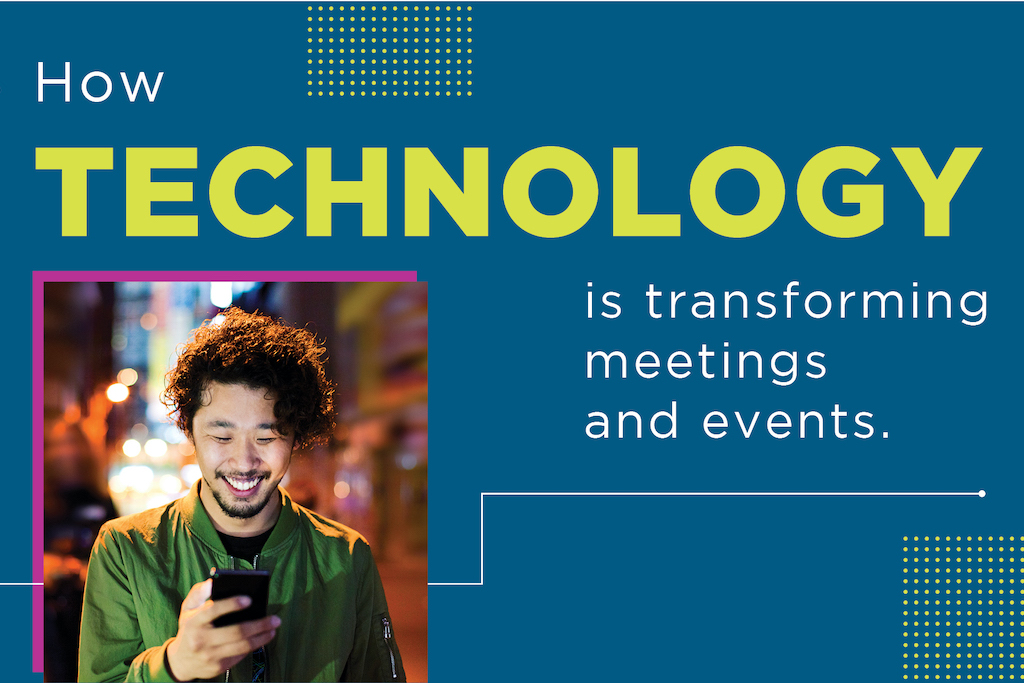The meeting and event industry needs to ensure that it is taking advantage of the recent developments in robotic process automation, machine learning and artificial intelligence to propel the sector forward, according to BCD Meetings & Events.
The global agency has published its latest industry report which covers how technology is transforming meetings & events. As well as highlighting the latest advancements in event management technology, the report focuses on the tools and tech meeting professionals can use to maximise their data and to upgrade their programmes.
The report offers insight into how BCD M&E has brought people and technology together to help evolve its proprietary tools and the overall event planning experience. “Harnessing these technologies allows the human workforce to focus on more strategic elements of business as well as improves the quality of data collected for our clients,” said Ted Stone, BCD M&E’s SVP, global technology & products.
Here’s some of the key insights from the report.
Robotic Process Automation
Also known as RPA, robotic process automation is the most basic form of emulating human behaviour such as keystrokes and mouse movement, with machine learning and artificial intelligence ranking higher in complexity.
BCD M&E is using RPA to move and process data in multiple systems. Most meetings require data to live in multiple systems: some third party, some proprietary and some internal to the client. The agency uses robotics to take data from the core business system and move or replicate it into various systems that are required. This brings efficiency to a process by saving operational teams from having to do the manual moving or re-keying while reducing the opportunity for error.
Equally important, RPA enables teams to offload daily manual and repetitive steps and focus on the strategic parts of their jobs instead, leading to greater employee engagement and satisfaction as they use their minds for broader things beyond data manipulation.
Machine Learning
While RPA is great at playing back instructions from a human, machine learning, a subfield of AI, allows for a machine to imitate intelligent human behaviour. In an industry that’s packed full of data, machine learning enables planners to better predict the future to help structure how we build and shape meetings.
With robust historical and current data sets, we’re able to harness this technology to build models and algorithms to provide future insights. The report gives the real world example of Netflix recommending shows based on shows you’ve previously watched and rated highly. In the meetings industry, one application for machine learning is resource modelling: Using historic data to identify and build future resource requirements and teams, ahead of time, for program expansion or new client engagements.
Artificial Intelligence
With meetings exceeding pre-pandemic levels, the volume of invoices is also trending upward. Organisations often use RPA in the finance department to take invoices into their system, but they can also layer in artificial intelligence (AI) to intelligently process electronic or scanned invoices and extract its data into a structured format, making financial reconciliation much easier.
For instance, AI can read line items (such as bedroom cost or food and beverage) and split them into data points within your own system. AI is especially helpful within life sciences, where AI can pull information from images of receipts and make sure those are aligning with compliance regulations for reporting. The best part: AI “learns” along the way and gets better over time at the task.
What’s next for AI?
ChatGPT, which is built on top of OpenAI’s family of large language models, is the next big thing in AI according to the report and has the potential to be revolutionary. In the events industry, ChatGPT is poised to transform the conventional chatbot, allowing for more natural conversation and fewer pre-determined replies.
This innovation will prove particularly useful for massive events and conferences, where tens of thousands of people might have unique questions that cannot be answered with stock replies. With AI, delegates will be able to interact with the chatbot as if they were speaking with a meeting planner over the phone without the need for extensive manpower.

